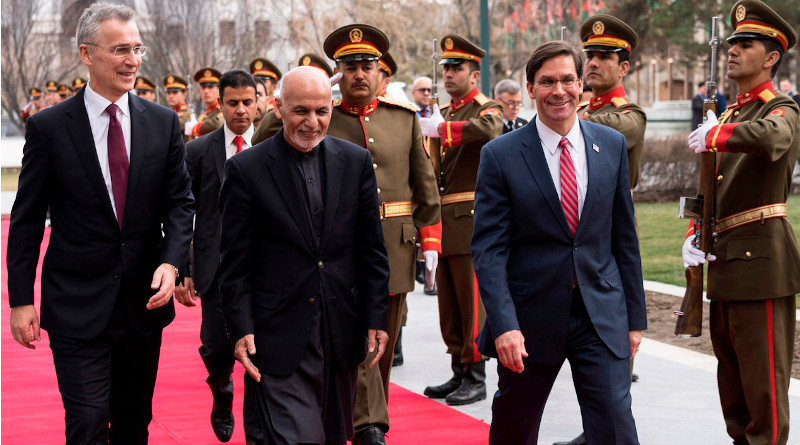Afghanistan: US-Taliban Peace Deal Perceptually Unsustainable – Analysis
By SAAG
By Dr Subhash Kapila
Afghanistan’s much awaited US-Taliban peace deal signed over last weekend perceptionaly emerges as unsustainable as it stands signed under weight of contemporary political pressures on both United States and the Taliban with extreme mutual distrust of each other’s warring opponents still menacingly hovering above the prospects.
The United States is under strong pressures of US presidential election year politics where even a partial withdrawal of US Forces deployed in Afghanistan for over seventeen years would be welcomed by the voters. US policy establishment would have been aware that Taliban insurgents inflicting heavy casualties in Southern Afghanistan bordering Pakistan could distort President Trump’s-election bid as inaction would open charges of dereliction of duty and commitments and ordering a ‘resurge’ of S Forces in Afghanistan would distort the election campaign.
The Talban is under pressure from heir Pakistani benefactors—the Pakistan Army Generals to temporise on a transient peace deal with the United States to give Pakistan time till June 2020 to tide over not being blacklisted by FATF. Pakistan is not influenced by any born-again strategic sentiments for the United States.
Any long term sustainable peace in Afghanistan is not in long terms interest of Pakistan without the Taliban being in in dominant political role in a future Kabul regime. The latter is not achievable as the incumbent Afghanistan regime in Kabul is being persistently being branded by the Taliban as a “puppet regime” of the United States. The Taliban has consistently refused intra-Afghan talks between the Taliban and the Kabul democratically elected government.
The three major points emerging as the foundation of the Peace Deal do not offer much promise of successful implementation. These three points are (1) United States would reduce US Forces from current strength of 13, 000 to 8,000 in 135 days. (2) Taliban will not permit Al Qaeda or other Islamic Jihadi outfits to function or operate in the areas under their control. (3) Groundwork would be laid for facilitating in the wake of the above for negotiations on future of Afghanistan between Afghan Government and the Taliban.
The most significant point which would militate against any successful evolution or progress of a full Peace Deal is that the foundation is based on a disputable and shaky premise of United States drawing a “Political Equivalence” between a democratically elected Kabul Government and further that it is preposterous to wash away the decades of brutalisation of the Afghan people by Islamic medieval practises which were alien to Afghanistan’s traditional ‘Honour Code’ stretching for centuries.
In fact the decades horrendous brutalities inflicted by the Taliban in Afghanistan qualifies for Taliban to leaders to be tried by ‘War Crimes Tribunals’ Instead what is emerging from this Peace Deal is that the Taliban leadership clique operating under orders of Pakistan Army ISI are being given a ‘seat of honour’ with the top diplomats of the mightiest power of the world, that is the United States.
In another political sense, the United States for reasons of political expediency is going behind the back of its own legitimately installed Kabul Government. This does not add lustre to United States political credentials and respectability and cannot be expected to go down well with the overall majority of Afghan people except those with Taliban backgrounds. It paints the United States as acting under duress by temporising with the Taliban whose displacement from Kabul was the main reason for United States military intervention in 2001in wake of 9/11.
Reverting back to the three points of the present Peace Deal, let us begin with the first point of United States agreeing the drawdown US Force levels from 13,000 to 8.600. This US concession is based on a unilateral acquiescence by the United States that the Taliban would honour the second and third points of the Peace Deal.
The Taliban has no authority or capabilities to ensure that the Al Qaeda and such like Islamic groups do not operate from areas currently under Taliban control in Afghanistan. Historically, it was the Taliban and the Pakistan Army which facilitated the embedment of Al Qaeda and other groups in Afghanistan. In the following years the Taliban has not given any credible evidence that it is inclined to liquidate presence of such elements from Afghanistan. In fact such elements provide Taliban with bargaining chips to be used against the United States.
Strategically, it is inconceivable that the Taliban would create conditions favourable to facilitate the opening of an intra-Afghan peace talks. This is in utter contradiction to Taliban’s long range blueprint for Afghanistan and also diametrically opposite to Pakistan Army’s strategic blueprint for Afghanistan.
On the face of it, no evidence is forthcoming in the public domain that the United States has put in place mechanisms for verification of points agreed to by Taliban that they are being honourably implemented.
Notably, the United States cannot have a call on any other Major Power like China or Russia to ensure that they could apply pressure on the Taliban to honour the points agreed to in the Peace Deal currently. China in any case has convergent interest with Pakistan’s strategic blueprint on Afghanistan.
Ironically, the ones who have the strongest and deepest stakes in Afghanistan’s sustainable peace and stability in Afghanistan—the people of Afghanistan—- stand side-lined and unheard in the Peace Deal process. To say that the Afghan people fully support Taliban’s hold over some areas fully in Afghanistan is a misnomer and defies reality
Concluding, it needs to be asserted that any US-Taliban Peace Deal is predestined for failure for reasons outlined above. Pakistan is the major part of the ills that plague Afghanistan and not the solutions as being erroneously made out by the United States. As recommended by me in my earlier writings that the United States has an inescapable imperative of embedding a Forward Military Presence in Afghanistan on the lines of Japan and South Korea at least for the next two decades.

